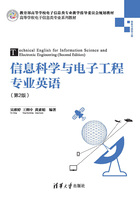
Preface
This textbook of technical English is intended for teaching undergraduates and graduate students majoring in information technology, communication engineering, electronic engineering, computer and related subjects.
English as a medium of communication is important in students' future career. The graduates will face various scientific articles, technical documents, product manuals, commercials, and other materials in English. However, having learned English ever since they entered primary school, many university students in their junior and senior years still lack adequate experiences and abilities in using the language as a tool. They are unable to acquire information and knowledge in the fast-developing technological fields, let alone express themselves in English orally or in written form. The problem does not primarily lie in grammar or vocabulary. Indeed, many students have a good mastery of the knowledge about English, but perhaps not the English language itself. They may know almost every rule of the grammar as well as a fairly large quantity of words, even rarely used ones. Some show extraordinary skills in tackling various exams. When coming to practical uses, however, things become quite different. Many students find it difficult to read technical materials at a reasonable speed and catch the message accurately, and don't know how to write in English correctly.
In view of the above, we emphasize actual use of the language, rather than the grammar. Taking into account the limited classroom hours and the practical needs of most students, this course mainly focuses on teaching student to read. The book covers a range of topics including communications, signal and information processing, electronic circuits and systems, microwaves, optical fibers, biomedical engineering, computer science, etc. Each unit consists of a text of 2500~3500 words in two or three parts, a vocabulary, some notes on the text, materials for off-classroom reading, and exercises. The exercises are not designed for grammar review, but rather, should be used as a supplement in improving students' reading ability.
It should be noted that, without a substantial amount of reading practice outside the classroom and continuous efforts after this course, only attending the lectures is far from enough for a student to be able to use technical English proficiently. Therefore, students are strongly encouraged to read as much as possible, not confined to the materials in the textbook.
Writing is not the main objective of the course. Nonetheless, we believe that reading proficiency resulting from intensive practical use and a good habit of careful observation while reading will greatly help enhance writing ability. Some notes on technical English writing are included in the Appendix.
This textbook is a result of many years' teaching practice of the authors and all members of the teaching group. The authors wish to express their sincere thanks to Chen Quanlin, Shi Hai, Zhu Qiuyu, Shi Xuli and Li Yingjie for their contributions and invaluable help over the years.
Without doubt, this book needs further improvements. Therefore any comments or recommendations are sincerely welcome and highly appreciated.
Wang Shuozhong, Huang Sujuan, Wu Yating
October 8, 2017